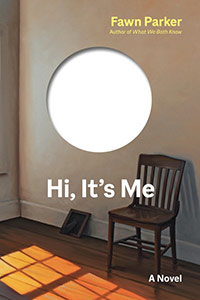Fawn Parker on her new novel and making poetry more accessible
Author: Kayla Cormier
Posted on Sep 17, 2024
Category: UNB Fredericton

Fawn Parker has been writing creatively since childhood.
Two decades later, she has published four novels and two poetry collections. Her most recent novel, Hi, It’s Me, is being released this week, and her last book, What We Both Know, made the 2022 Giller Prize longlist.
She has obtained two degrees, is in the process of obtaining a third and was recently named Poet Laureate of Fredericton.
Despite her many successes, she humbly calls herself an accidental academic.
“I have always been primarily creative, always wanted to be a writer. I did the undergraduate and a master’s, but I always felt like I was taking the literature courses so I could do the creative ones.”
Parker is currently a creative writing PhD student at the University of New Brunswick (UNB), exploring women and mental illness. It is one of only two doctoral programs in creative writing offered in Canada.
“I knew if I could ever possibly do a PhD, it had to be this one. My dissertation will be a novel,” she said.
Parker admits she had romanticized the Maritimes before moving here but says it has lived up to her expectations.
“I have lived in Toronto and Montreal, but the tempo in Fredericton just feels right for me. There is a lot happening in the arts world – but it doesn’t have that huge, overwhelming New York feeling.
“I really like knowing who my neighbours are. I like going to the market on Saturdays. Those mundane things are helpful for my work, because I’m often sort of thinking about reframing the little things of everyday life.”
“It’s easier to see those things when there’s space and room to breathe.”
Fredericton’s new Poet Laureate
In July of this year, Parker was named Poet Laureate of Fredericton. She began her two-year term on Sept. 1.
She credits Sue Sinclair, Canadian poet and associate professor of English at UNB, for encouraging her to apply for the position.
“It felt like when your dream job comes up on LinkedIn and you just apply for the gesture of it. I really didn’t think I would ever get it, at least not this early in my life.”
When her appointment was announced, Parker shared her desire to make poetry more accessible.
“I see accessibility with poetry in two ways,” she said.
“There’s a general feeling that people don’t think they can understand poetry. Just looking at a poem on a page and figuring out how to sit with it or digest it can be overwhelming.
“I want to encourage people to have the confidence to approach a poem in the first place. They’re not tricks. They’re forms of expression, the way any art is.”
She also thinks of accessibility in terms of bringing local poetry to new spaces.
“You might have classics like War and Peace sitting in a hospital room,” she said.
“But it would be great to have literature that’s fresh and regionally relevant.”
For Parker, it’s not just about supporting local poets.
“Maybe I’m biased because I’m a writer and a reader, but literature is my connection to the world – it’s how I feel tethered to my community. So, I think for somebody in a space like a hospital, where you could feel isolated – things that tether us are really important.”
She submits that writing fiction and poetry are two very different processes – and that writing poetry is a way of processing emotion.
“Fiction feels like very structured work for me, there’s more architecture happening, but poetry just comes to me. It feels fluid – like movement – in a way that’s very beautiful. It has helped me through grief and illness and life in general.”
“This is the first time I think I’ve been called to write poetry where there’s deadlines,” she laughed. “It will be a new, exciting challenge.”
Hi, It’s Me

If she didn’t already have enough happening, Parker’s newest novel, Hi, It’s Me (McClelland & Stewart 2024), was published on Sept. 17.
Hi, It’s Me feels almost conversational, at times so precise and exacting that you forget you are not reading your own thoughts and experiences but someone else’s.
Parker calls it “a collage of fiction,” at the heart of which is an archive of her real-life mother’s texts, like grocery lists, calendars and journal entries.
The novel’s protagonist, also Parker, and her recently deceased mother, are the only ‘real’ characters.
“I took my real self and thought, what would it be like if the day my mother died unfolded in this alternate reality?”
Her non-fictional mother had a dream of having a lavender farm and making soap with her friends in the countryside.
“In a way, it was like giving something to my mom that she didn’t have time to execute in her real life,” she said.
And while Parker writes about her mother intimately and with affection, Hi, It’s Me is never sentimental.
“I couldn’t represent [my mother] in one way. I really loved this person and admired her, and I am who I am because of her. But I also am who I am because of her in a bad way.”
“I wanted to get her on the page as she was.”
The novel draws inspiration from James Joyce’s Ulysses in that it takes place over the course of one day, in the hours following her mother’s death.
“I was reading Ulysses a few years before my mom died … and I loved the concept that you could stretch an entire day into a novel,” she said.
“It’s a funny idea because Ulysses is this massive, daunting classic text that’s terribly difficult to read. So, writing my version felt a bit ironic because you certainly don’t have to have read Joyce to read my book.”
Hi, It’s Me confronts and examines the often unspoken, often performative parts of grieving with wry humour and precision.
“I had two streams of thought while I was processing the early grief. Part of me was totally overwhelmed and numb and devastated.
“But I also had this other part that was observing and taking in what was going on, and I just thought, people are weird. The things we do, the things we say, the things we don't say. It just all felt ridiculous.
“That humour just really got me through the weirdness and sadness of grief,” she said.
“Everything is funny, and it’s not. Life can be really terrifying, but we still laugh, and you know, death is the same.”
Learn more about Fawn Parker and her work
